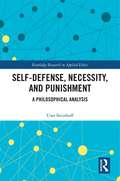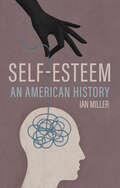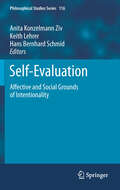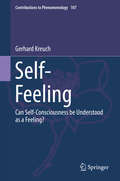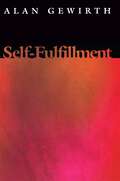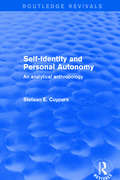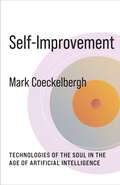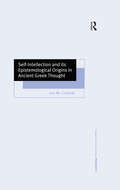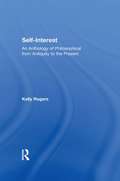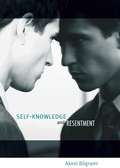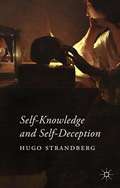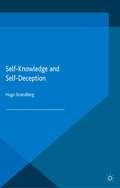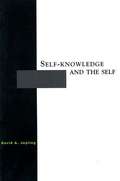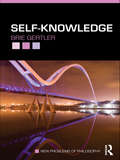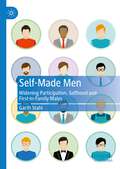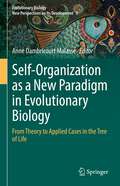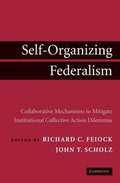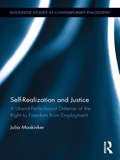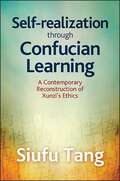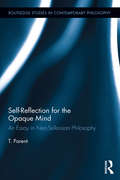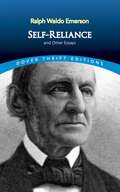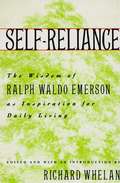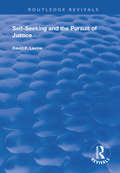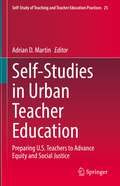- Table View
- List View
Self-Defense, Necessity, and Punishment: A Philosophical Analysis (Routledge Research in Applied Ethics)
by Uwe SteinhoffThis book offers a philosophical analysis of the moral and legal justifications for the use of force. While the book focuses on the ethics self-defense, it also explores its relation to lesser evil justifications, public authority, the justification of punishment, and the ethics of war. Steinhoff’s account of the moral use of force covers a wide range of topics, including the nature of justification in general, the precise elements of different justifications, the logic of claim- and liberty-rights and of rights forfeiture, the value of human life and its limits, and the princples of reciprocity and precaution. While the author’s analysis is primarily philosophical, it is informed by a metaethical stance that also places heavy emphasis on existing law and legal scholarship. In doing so, the book appeals to widely shared moral intuitions, precepts, and concepts grounded in criminal law. Self-Defense, Necessity, and Punishment offers the most comprehensive and systematic account of the ethics of self-defense. It will be of interest to scholars and graduate students working in applied ethics and moral philosophy, philosophy of law, and political philosophy.
Self-Esteem: An American History
by Ian MillerAt the end of the last century, the idea of self-esteem became enormously influential. A staggering amount of psychological research and self-help literature was published, and before long was devoured by readers. Self-esteem initiatives permeated American schools. Self-esteem became the way of understanding ourselves, our personalities, our interactions with others. Nowadays, few people think much about the idea of self-esteem—but perhaps we should.Self-Esteem: An American History is the first historical study exploring the emotional politics of self-esteem in modern America. Written with verve and insight, Ian Miller’s expert analysis explores the critiques of self-help which accuse it of propping up conservative agendas by encouraging us to look solely inside ourselves to resolve life’s problems. At the same time, he reveals how African American, LGBTQ+ and feminist activists endeavored to build positive collective identities based upon self-esteem, pride and self-respect.This revelatory book will be essential reading for anyone with an interest in the history of mental health, well-being, emotions in the United States’ unique society and culture.
Self-Evaluation
by Hans Bernhard Schmid Keith Lehrer Anita Konzelmann ZivThe book contains contributions by leading figures in philosophy of mind and action, emotion theory, and phenomenology. As the focus of the volume is truly innovative we expect the book to sell well to both philosophers and scholars from neighboring fields such as social and cognitive science. The predominant view in analytic philosophy is that an ability for self-evaluation is constitutive for agency and intentionality. Until now, the debate is limited in two (possibly mutually related) ways: Firstly, self-evaluation is usually discussed in individual terms, and, as such, not sufficiently related to its social dimensions; secondly, self-evaluation is viewed as a matter of belief and desire, neglecting its affective and emotional aspects. The aim of the book is to fill these research lacunas and to investigate the question of how these two shortcomings of the received views are related.
Self-Feeling: Can Self-Consciousness be Understood as a Feeling? (Contributions to Phenomenology #107)
by Gerhard KreuchThis monograph offers new insights into the connection between self-consciousness and emotion. It focuses on what fundamental “feelings of being” tell us about ourselves. The results enrich the philosophy of human affectivity and help shed new light on some pressing, current problems. The author seeks to understand self-consciousness as an affective phenomenon, namely as self-feeling. He identifies it as a pre-reflective, pre-propositional, bodily feeling that shapes our space of possibilities. It is the affective disclosure of individual existence. His account overcomes the difficulties of infinite regress and vicious circularity that reflective (or higher-order) accounts of self-consciousness struggle with. At the same time, it helps build a bridge between the basic level of self-consciousness and the higher level of more substantial thoughts about oneself. The title explores fundamental affectivity, Matthew Ratcliffe’s theory of existential feelings, features of self-feeling, and appropriateness and inappropriateness in self-interpretation. It also considers the contributions of the Heidelberg School of self-consciousness to current debates. The title provides students and researchers with a unique look into such vital philosophical questions as: What is self-consciousness? How do we know ourselves? It will also appeal to a wider audience interested in self-consciousness and/or human affectivity since it does not presuppose knowledge of the jargon.
Self-Fulfillment
by Alan GewirthCultures around the world have regarded self-fulfillment as the ultimate goal of human striving and as the fundamental test of the goodness of a human life. The ideal has also been criticized, however, as egotistical or as so value-neutral that it fails to distinguish between, for example, self-fulfilled sinners and self-fulfilled saints. Alan Gewirth presents here a systematic and highly original study of self-fulfillment that seeks to overcome these and other arguments and to justify the high place that the ideal has been accorded. He does so by developing an ethical theory that ultimately grounds the value of self-fulfillment in the idea of the dignity of human beings. Gewirth begins by distinguishing two models of self- fulfillment--aspiration-fulfillment and capacity-fulfillment--and shows how each of these contributes to the intrinsic value of human life. He then distinguishes between three types of morality--universalist, particularist, and personalist--and shows how each contributes to the values embodied in self-fulfillment. Building on these ideas, he develops a Odialectical' conception of reason that shows how human rights are central to self-fulfillment. Gewirth also argues that self-fulfillment has a social as well as an individual dimension: that the nature of society and the obstacles that disadvantaged groups face affect strongly the character of the self-fulfillment that persons can achieve. Bold in scope and rigorous in execution, Self-Fulfillment is a powerful new contribution to moral, social, and political philosophy.
Self-Identity and Personal Autonomy: An Analytical Anthropology (Routledge Revivals)
by Stefaan E. CuypersThis title was first published in 2001: We are all persons or selves. But what exactly does it mean that we possess an identity and autonomy as persons or selves? This book explores the related problems of self-identity and personal autonomy within the framework of contemporary analytical anthropology, a blend of analytical philosophy of mind and action with moral psychology. Cuypers critically examines the empiricist bundle theory and metaphysical ego theory of self-identity as well as the hierarchical Frankfurt / Dworkin model of personal autonomy. Arguing that all these standard views are found wanting, Cuypers then offers an alternative 'personalist' theory of personal identity, plus an innovative 'moderately heteronomous' theory of autonomy without ever going beyond the analytical frame of reference. In critical discussion with analytical philosophers such as Derek Parfit, John Perry and Harry Frankfurt, this book develops an original perspective on the nature of persons or selves that is orthogonal to the received views in analytical anthropology. Stefaan E. Cuypers is Professor at the Institute of Philosophy, Catholic University of Leuven, Belgium
Self-Improvement: Technologies of the Soul in the Age of Artificial Intelligence (No Limits)
by Mark CoeckelberghWe are obsessed with self-improvement; it’s a billion-dollar industry. But apps, workshops, speakers, retreats, and life hacks have not made us happier. Obsessed with the endless task of perfecting ourselves, we have become restless, anxious, and desperate. We are improving ourselves to death. The culture of self-improvement stems from philosophical classics, perfectionist religions, and a ruthless strain of capitalism—but today, new technologies shape what it means to improve the self. The old humanist culture has given way to artificial intelligence, social media, and big data: powerful tools that do not only inform us but also measure, compare, and perhaps change us forever.This book shows how self-improvement culture became so toxic—and why we need both a new concept of the self and a mission of social change in order to escape it. Mark Coeckelbergh delves into the history of the ideas that shaped this culture, critically analyzes the role of technology, and explores surprising paths out of the self-improvement trap. Digital detox is no longer a viable option and advice based on ancient wisdom sounds like yet more self-help memes: The only way out is to transform our social and technological environment. Coeckelbergh advocates new “narrative technologies” that help us tell different and better stories about ourselves. However, he cautions, there is no shortcut that avoids the ancient philosophical quest to know yourself, or the obligation to cultivate the good life and the good society.
Self-Intellection and its Epistemological Origins in Ancient Greek Thought (Ashgate New Critical Thinking in Philosophy)
by Ian M. CrystalCan the intellect or the intellectual faculty be its own object of thought, or can it not think or apprehend itself? This book explores the ancient treatments of the question of self-intellection - an important theme in ancient epistemology and of considerable interest to later philosophical thought. The manner in which the ancients dealt with the intellect apprehending itself, took them into both the metaphysical and epistemological domains with reflections on questions of thinking, identity and causality. Ian Crystal traces the origins from which the concept of self-intellection springs, by examining Plato's account of the epistemic subject and the emergence of self-intellection through the Aristotelian account, before the final part of the book explores the problem of how the intellect apprehends itself, and its resolution including Plotinus' reformulation and the dilemma raised by Sextus Empiricus. Crystal concludes that Plotinus recasts the metaphysical structures of Plato and Aristotle in such a way that he casts the concept of self-intellection in an entirely new light and offers a solution to the problem.
Self-Interest: An Anthology of Philosophical Perspectives from Antiquity to the Present (Social Philosophy And Policy Ser. #No. 14, Pt. 1)
by Kelly RogersSelf-Interest discusses the reconciliation of inevitable self-concern with its manifest potential for harm. This anthology brings together the efforts of twenty three renown philosophers to address the matter of how to bring about such a reconciliation. The drive for self-preservation, as observed by Aquinas, is the first law of nature. With this self-love, however, comes the threat of "the excessive love of self". Self-Interest brings into discussion the reconciliation of necessary self-concern with its manifest potential for harm. This anthology brings together the work of twenty-three important philosophers to address the question of how to bring about such a reconciliation. Contributors include: Democritus, Plato, Aristotle, Augustine of Hippo, Aquinas,Hobbes, Nicole, Mandeville, Butler, Hutchenson, Hume, Smith, Kant, Bentham, Mill, James, Nietzsche, Dewey, Rand, and Gauthier.
Self-Knowledge and Resentment
by Akeel BilgramiIn Self-Knowledge and Resentment, Akeel Bilgrami argues that self-knowledge of our intentional states is special among all the knowledges we have because it is not an epistemological notion in the standard sense of that term, but instead is a fallout of the radically normative nature of thought and agency. Four themes or questions are brought together into an integrated philosophical position: What makes self-knowledge different from other forms of knowledge? What makes for freedom and agency in a deterministic universe? What makes intentional states of a subject irreducible to its physical and functional states? And what makes values irreducible to the states of nature as the natural sciences study them? This integration of themes into a single and systematic picture of thought, value, agency, and self-knowledge is essential to the book's aspiration and argument. Once this integrated position is fully in place, the book closes with a postscript on how one might fruitfully view the kind of self-knowledge that is pursued in psychoanalysis.
Self-Knowledge and Self-Deception
by Hugo StrandbergThe aim of this book is to acquire a better understanding of the question 'who am I?' By means of the concepts of self-knowledge and self-deception questions about the self are studied. The light in which its topic is seen is the light of love, the light in which other people really become visible and so oneself in one's relation to them.
Self-Knowledge and the Self
by David A JoplingIn this clear and reasoned discussion of self- knowledge and the self, the author asks whether it is really possible to know ourselves as we really are. He illuminates issues about the nature of self-identity which are of fundamental importance in moral psychology, epistemology and literary criticism. Jopling focuses on the accounts of Stuart Hampshire, Jean-Paul Sartre and Richard Rorty, and dialogical philosophical psychology and illustrates his argument with examples from literature, drama and psychology.
Self-Knowledge: Philosophical Accounts Of Self-knowledge (New Problems of Philosophy)
by Brie GertlerHow do you know your own thoughts and feelings? Do we have ‘privileged access’ to our own minds? Does introspection provide a grasp of a thinking self or ‘I’? The problem of self-knowledge is one of the most fascinating in all of philosophy and has crucial significance for the philosophy of mind and epistemology. In this outstanding introduction Brie Gertler assesses the leading theoretical approaches to self-knowledge, explaining the work of many of the key figures in the field: from Descartes and Kant, through to Bertrand Russell and Gareth Evans, as well as recent work by Tyler Burge, David Chalmers, William Lycan and Sydney Shoemaker. Beginning with an outline of the distinction between self-knowledge and self-awareness and providing essential historical background to the problem, Gertler addresses specific theories of self-knowledge such as the acquaintance theory, the inner sense theory, and the rationalist theory, as well as leading accounts of self-awareness. The book concludes with a critical explication of the dispute between empiricist and rationalist approaches. Including helpful chapter summaries, annotated further reading and a glossary, Self Knowledge is essential reading for those interested in philosophy of mind, epistemology, and personal identity.
Self-Made Men: Widening Participation, Selfhood and First-in-Family Males
by Garth StahlThis book explores how boys from low-socioeconomic status backgrounds disengage from their education, and are resultantly severely underrepresented in post-compulsory education. For those who attend university, many will be first-in-their-family. As first-in-family students, they may encounter significant barriers which may limit their participation in university life and their acquisition of social and cultural capital. Drawing on a longitudinal study of young Australian men pursuing higher education, the book provides the first detailed account of socially mobile working-class masculinities. Investigating the experiences of these young men, this book analyses their acclimatisation to new learning environments as well as their changing subjectivities. The monograph draws on various sociological theories to analyse empirical data and make practical recommendations which will drive innovation in widening participation initiatives internationally. This book will be of interest to scholars interested in widening participation, transitions, social mobility and Critical Studies of Men and Masculinities.
Self-Organization as a New Paradigm in Evolutionary Biology: From Theory to Applied Cases in the Tree of Life (Evolutionary Biology – New Perspectives on Its Development #5)
by Anne Dambricourt MalasséThe epistemological synthesis of the various theories of evolution, since the first formulation in 1802 with the transmission of the inherited characters by J.B. Lamarck, shows the need for an alternative synthesis to that of Princeton (1947). This new synthesis integrates the scientific models of self-organization developed during the second half of the 20th century based on the laws of physics, thermodynamics, and mathematics with the emergent evolutionary problematics such as self-organized memory.This book shows, how self-organization is integrated in modern evolutionary biology. It is divided in two parts: The first part pays attention to the modern observations in paleontology and biology, which include major theoreticians of the self-organization (d’Arcy Thompson, Henri Bergson, René Thom, Ilya Prigogine). The second part presents different emergent evolutionary models including the sciences of complexity, the non-linear dynamical systems, fractals, attractors, epigenesis, systemics, and mesology with different examples of the sciences of complexity and self-organization as observed in the human lineage, from both internal (embryogenesis-morphogenesis) and external (mesology) viewpoints.
Self-Organized Criticality
by Henrik Jeldtoft JensenSelf-organized criticality (SOC) is based upon the idea that complex behavior can develop spontaneously in certain multi-body systems whose dynamics vary abruptly. This book is a clear and concise introduction to the field of self-organized criticality, and contains an overview of the main research results. The author begins with an examination of what is meant by SOC, and the systems in which it can occur. He then presents and analyzes computer models to describe a number of systems, and he explains the different mathematical formalisms developed to understand SOC. The final chapter assesses the impact of this field of study, and highlights some key areas of new research. The author assumes no previous knowledge of the field, and the book contains several exercises. It will be ideal as a textbook for graduate students taking physics, engineering, or mathematical biology courses in nonlinear science or complexity.
Self-Organizing Federalism: Collaborative Mechanisms to Mitigate Institutional Collective Action Dilemmas
by Richard C. Feiock John T. ScholzThis book investigates the self-organizing responses of governments and interests to the institutional collective action (ICA) dilemmas of particular concern to students of federalism, urban governance, and regional management of natural resources. ICA dilemmas arise in fragmented systems whenever decisions by one independent formal authority do not consider costs or benefits imposed on others. The ICA framework analyzes networks, joint projects, partnerships, and other mechanisms developed by affected parties to mitigate ICA decision externalities. These mechanisms play a widespread but little-understood role in federalist systems by reshaping incentives in order to encourage coordination/cooperation. The empirical studies of urban service delivery and regional integration of regional resource management address three questions: How does a given mechanism mitigate costs of uncoordinated decisions? What incentives do potential members have to create the mechanism? How do incentives induced by the mitigating mechanism affect its sustainability in a changing environment and its adaptability to other ICA dilemmas?
Self-Realization and Justice: A Liberal-Perfectionist Defense of the Right to Freedom from Employment (Routledge Studies in Contemporary Philosophy)
by Julia MaskivkerIn this book, Maskivker argues that there ought to be a right not to participate in the paid economy in a new way; not by appealing to notions of fairness to competing conceptions of the good, but rather to a contentious (but defensible) normative ideal, namely, self-realization. In so doing, she joins a venerable tradition in ethical thought, initiated by Aristotle and developed in the work of important eighteenth and nineteenth century thinkers including Smith, Hume, and Marx.The book engages on-going debates (in both philosophical and real world political and social policy circles) about the provision of basic income grants, necessary to make the possibility of self-realization real for all. Traditional defenses of unconditional welfare benefits emphasize ideals of state neutrality when they claim that society should not discriminate against preferences for leisure in favor of preferences for work. According to these views, the state ought not to interfere with people’s choices about what constitutes the "good life." In contradistinction, Maskivker offers an innovative argument in defense of a particular ideal of the "good life," namely, life-goals directed at the pursuit of self-realization. However, her understanding of self-realization appeals to modern and contemporary values of freedom and pluralism. In a refreshingly new light, the book strikes a balance between fascinating debates on the conditions of human flourishing on the one hand, and heated discussions about the Welfare State on the other.
Self-Realization through Confucian Learning: A Contemporary Reconstruction of Xunzi's Ethics (SUNY series in Chinese Philosophy and Culture)
by Siufu TangSelf-Realization through Confucian Learning reconstructs Confucian thinker Xunzi's moral philosophy in response to the modern focus on self-realization. Xunzi (born around 310 BCE) claims that human xing ("nature" or "native conditions") is without an ethical framework and has a tendency to dominate, leading to bad judgments and bad behavior. Confucian ritual propriety (li) is needed to transform these human native conditions. Through li, people become self-directing: in control of feelings and desires and in command of their own lives. Siufu Tang explicates Xunzi's understanding of the hierarchical structure of human agency to articulate why and how li is essential to self-realization. Ritual propriety also structures relationships to make a harmonious communal life possible. Tang's focus on self-realization highlights how Confucianism can address the individual as well as the communal and serve as a philosophy for contemporary times.
Self-Reflection for the Opaque Mind: An Essay in Neo-Sellarsian Philosophy (Routledge Studies in Contemporary Philosophy)
by T. ParentThis volume attempts to solve a grave problem about critical self-reflection. The worry is that we critical thinkers are all in "epistemic bad faith" in light of what psychology tells us. After all, the research shows not merely that we are bad at detecting "ego-threatening" thoughts à la Freud. It also indicates that we are ignorant of even our ordinary thoughts—e.g., reasons for our moral judgments of others (Haidt 2001), and even mundane reasons for buying one pair of stockings over another! (Nisbett & Wilson 1977) However, reflection on one’s thoughts requires knowing what those thoughts are in the first place. So if ignorance is the norm, why attempt self-reflection? The activity would just display naivety about psychology. Yet while respecting all the data, this book argues that, remarkably, we are sometimes infallible in our self-discerning judgments. Even so, infallibility does not imply indubitability, and there is no Cartesian ambition to provide a "foundation" for empirical knowledge. The point is rather to explain how self-reflection as a rational activity is possible.
Self-Reliance and Other Essays (Dover Thrift Editions)
by Ralph Waldo EmersonEssayist, poet, and philosopher, Ralph Waldo Emerson (1803–1882) propounded a transcendental idealism emphasizing self-reliance, self-culture, and individual expression. The six essays and one address included in this volume, selected from Essays, First Series (1841) and Essays, Second Series (1844), offer a representative sampling of his views outlining that moral idealism as well as a hint of the later skepticism that colored his thought. In addition to the celebrated title essay, the others included here are "History," "Friendship," "The Over-Soul," "The Poet," and "Experience," plus the well-known and frequently read Harvard Divinity School Address.
Self-Reliance: The Wisdom of Ralph Waldo Emerson as Inspiration for Daily Living
by Richard WhelanA finely honed abridgement of Emerson's principal essays with an introduction that clarifies the essence of Emerson's ideas and establishes their relevance to our own troubled era. This is the first truly accessible edition of Emerson's work, revealing him to be one of America's wisest teachers.
Self-Seeking and the Pursuit of Justice (Routledge Revivals)
by David P. LevineFirst published in 1997, this volume delves into the most influential theories of economic justice, which ground themselves in utilitarian or related contractarian ideas about the self. These ideas take self-interest to be transparent and unproblematic. Favoured assumptions about the self also make scarcity the primary reality with which economic justice must deal. Much is lost in consideration of the justness of economic arrangements when we take the wants and interests of the self for granted in this way, and treat scarcity as a premise. In this book the author places the discussion of economic justice on a sounder foundation as regards the nature and ends of the self. The book begins with a discussion of the self as a structure, and proceeds to consider aspects of self-interest, public ends, economic welfare, needs and wants, the limits of the market, economic democracy, global inequality, and justice as the end of development.
Self-Studies in Urban Teacher Education: Preparing U.S. Teachers to Advance Equity and Social Justice (Self-Study of Teaching and Teacher Education Practices #25)
by Adrian D. MartinThis book critically explores pedagogical activities, policies, and coursework that teacher education programs can provide to more fully prepare teacher candidates and in-service educators for professional practice in urban schools. It illustrates how teacher educators from across the United States are supporting teacher candidates and in-service teachers to possess the knowledge, skills, and dispositions for equity-oriented instructional practices and advocacy for professional engagement in the urban context. Chapters share insider perspectives of urban teacher education on preparing teachers to teach in culturally, linguistically, and socio-economically diverse classrooms. They discuss teacher educators’ learning about their own practice in the preparation of teachers for city schools, preparing teacher candidates from rural and suburban contexts to teach in urban settings, and supervising practicing teachers in city classrooms. The volume also focuses on the interplay of cultural and linguistic parity between teacher educators and their preservice/in-service teacher students, implementing learning activities or coursework about teaching in urban schools, and enacting critical pedagogical practices. This book will be beneficial to teacher educators focused on teacher preparation for city classrooms and urban school districts, and researchers seeking to adopt self-study methodology in their own research endeavors.
